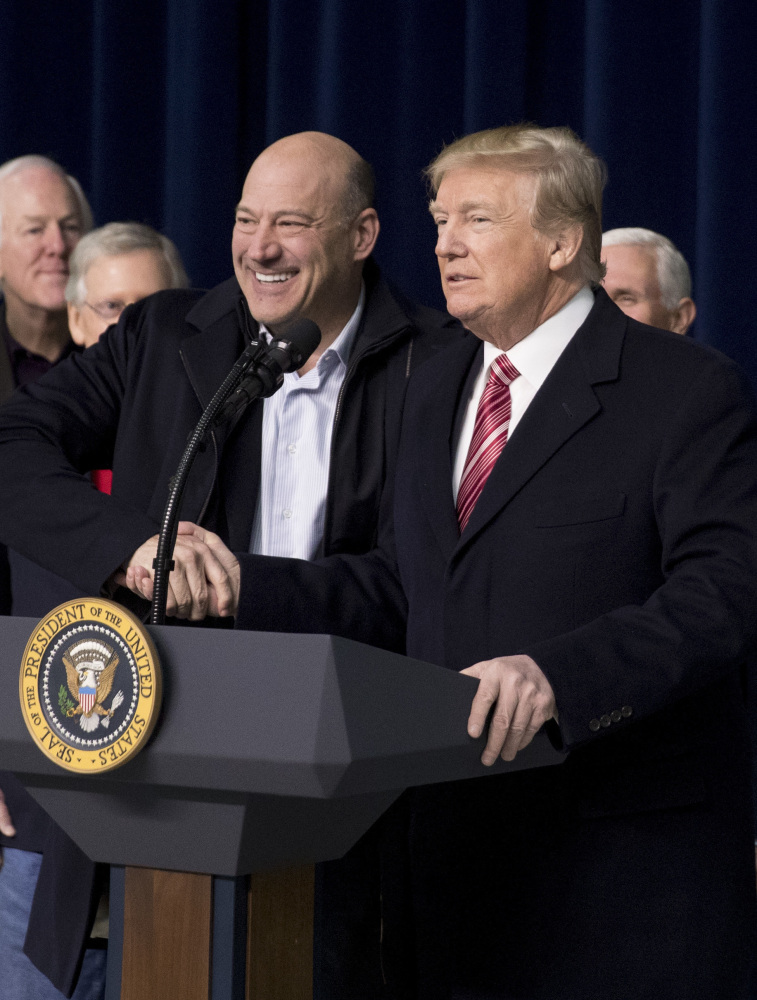WASHINGTON — President Trump expressed misgivings about his administration’s infrastructure plan Friday at Camp David, telling Republican leaders that building projects through public-private partnerships is unlikely to work – and that it may be better for the government to pursue a different path.
Then on Saturday morning, Gary Cohn, the president’s chief economic adviser, delivered a detailed proposal on infrastructure and public-private partnerships that seemed to contradict the president. He said the administration hoped $200 billion in new federal spending would trigger almost $1 trillion in private spending and local and state spending, according to people familiar with his comments.
Cohn seemed to present the plan as the administration’s approach, although the president had suggested such an approach might not work.
The seemingly contradictory statements, made within 24 hours of each other, show the administration’s uncertainty on its top legislative priority in 2018: building roads, bridges and highways. Trump and his White House have been determined to pitch an infrastructure plan in 2018, despite Republican misgivings about the cost, a rapidly rising deficit and a preference to consider others matters first.
White House officials and Hill aides confirmed the president’s comments. Another White House official briefed on the comments said that Trump was musing aloud and that the administration still planned to pursue public-private partnerships for infrastructure. This person, though, said Trump had continually expressed skepticism behind the scenes about such a plan. “He doesn’t think they will work,” the person said.
Trump and Cohn have had a rocky relationship since the economic adviser criticized the president’s comments about white-supremacist riots in Charlottesville, suggesting that there were “many fine people on both sides.”
Several White House advisers have said recently that the former Goldman Sachs banker may exit. Asked about that Saturday, Trump pulled Cohn up to a news conference stage and asked if he was staying. The economic adviser said yes and that he was having fun.
“Gary, hopefully, will be staying for a long time,” Trump said. “Now, if he leaves, I’m going to say: ‘I’m very happy that he left.’ OK? All right?”
“I’m happy,” Cohn said.
Republicans are loath to spend $1 trillion on infrastructure, as the deficit is expected to grow considerably as a result of the tax plan passed in December. Trump did not specifically delineate how he would pay for the projects without the partnerships.
During the campaign, Trump promised a $1 trillion infrastructure plan that he said would create millions of jobs through a combination of investments from the federal government and private companies. Staff members at the White House have spent months assembling a package of ideas, though his first budget just allocated $20 billion a year over 10 years for the mostly unspecified projects.
In September, though, Trump began musing to Democrats and others that the public-private partnership idea might not work. He referenced at least once some projects in Indiana that he believed did not work out the way the private sector had promised.
In 2014, then-Gov. Mike Pence arranged a deal with Isolux Corsan, a Spanish construction firm, to extend a stretch of interstate in the southern part of Indiana. The firm turned in the lowest bid but had never completed a project in the United States, and it fell behind schedule. The state of Indiana had to eventually dissolve the partnership and issued public debt to finish the project, though it still remains incomplete.
Trump’s repeated complaints about the effectiveness of public-private partnerships have infuriated and surprised some administration aides who have worked on the plans for months. They were hoping to propose a package of infrastructure goals this month, though that timetable remains fluid.
Democrats have often said they would support more infrastructure spending, and many labor unions have also said they would like to work with Trump on these plans. But they have remained wary of how Trump would pay for any of the projects, and those questions appear to remain unresolved.
Send questions/comments to the editors.


